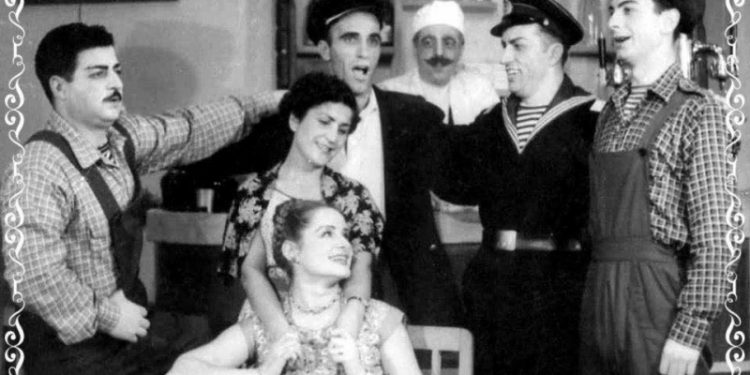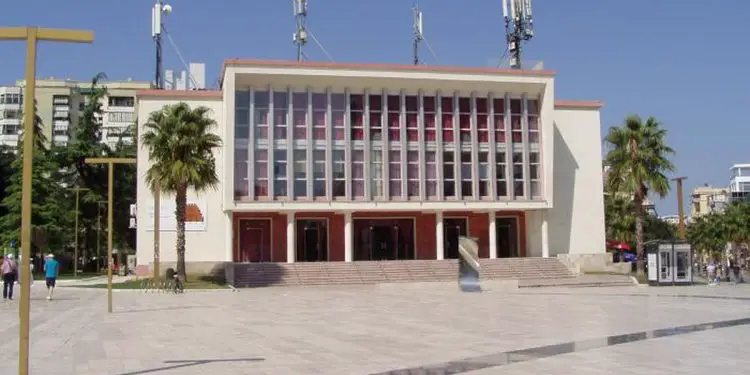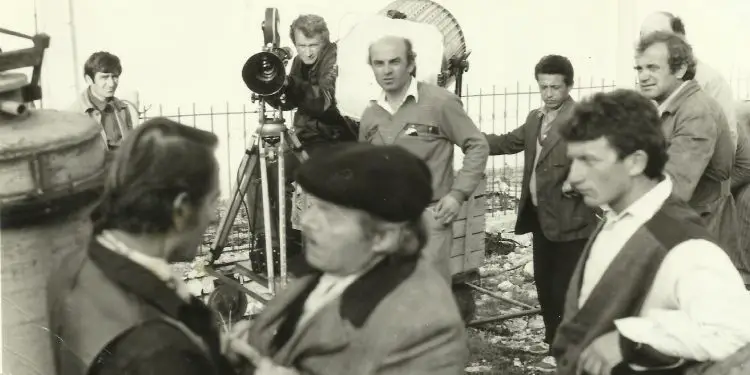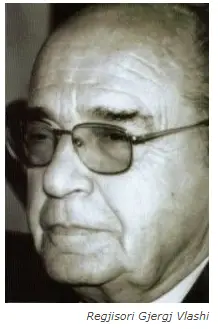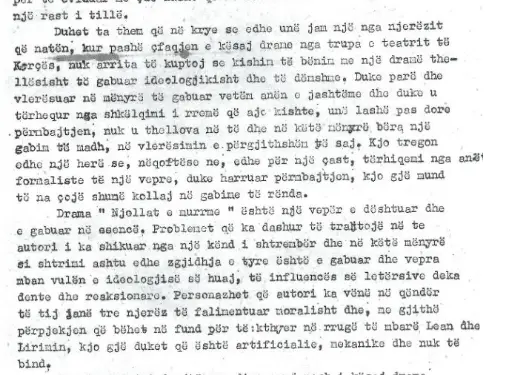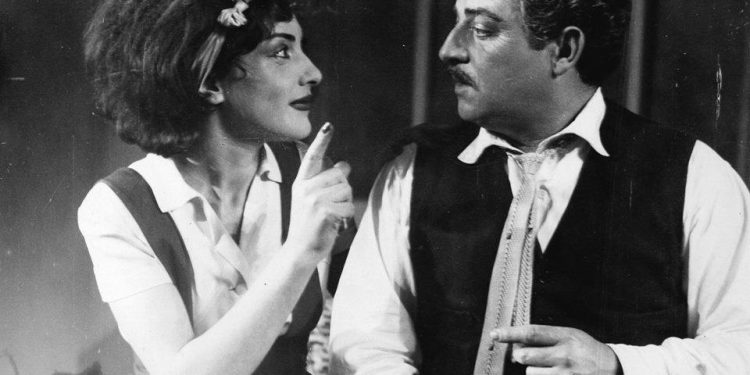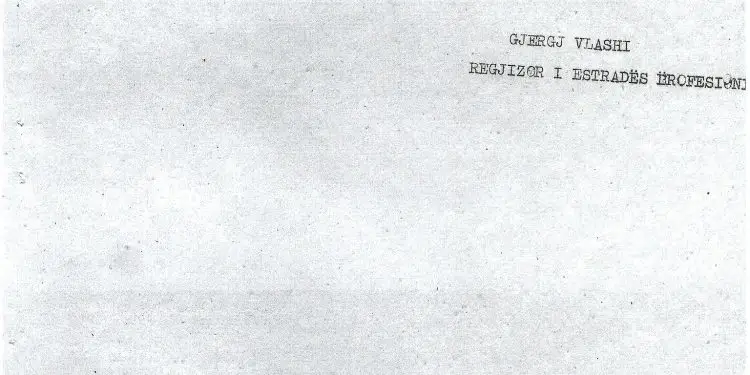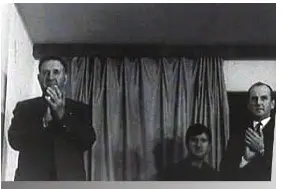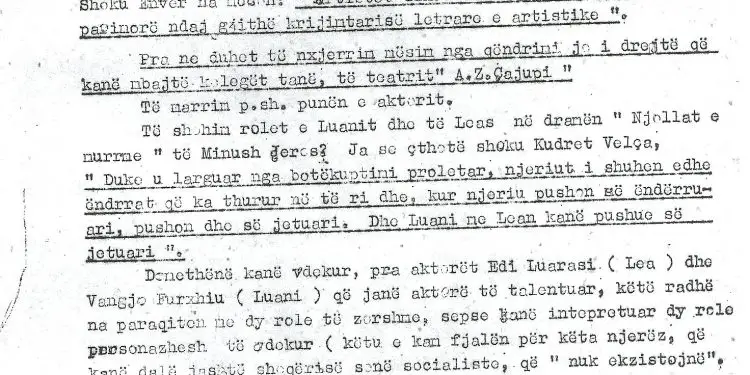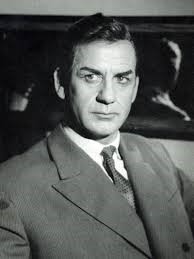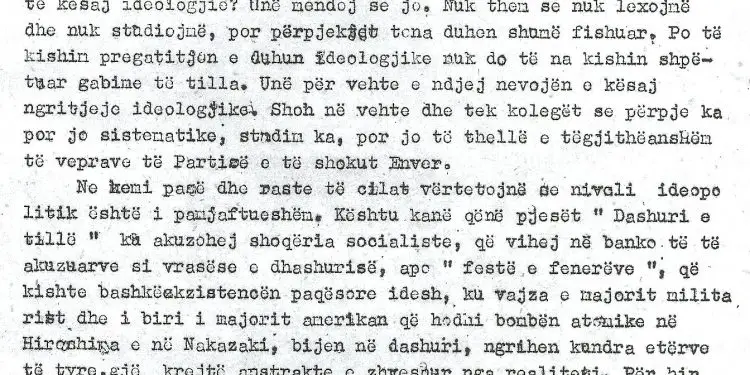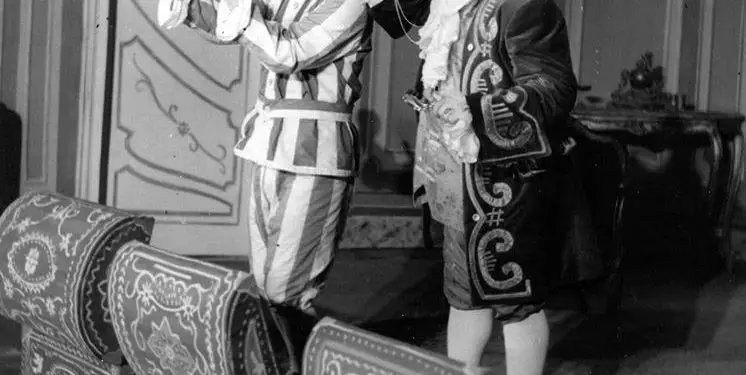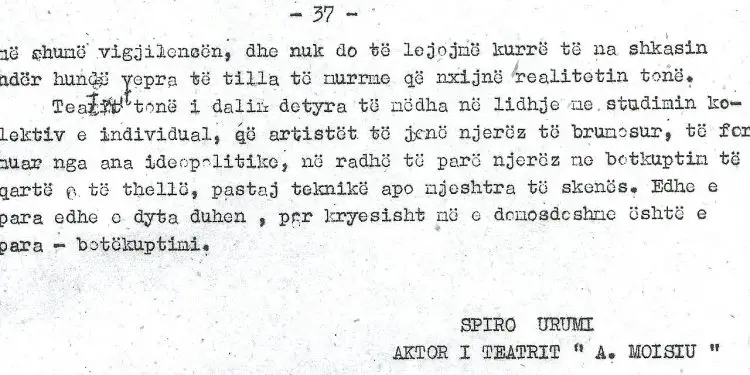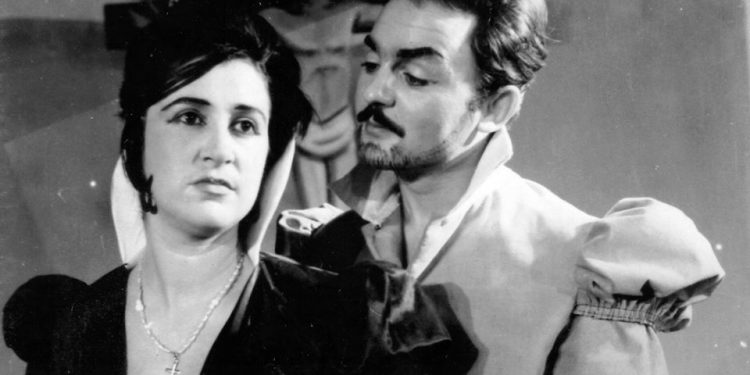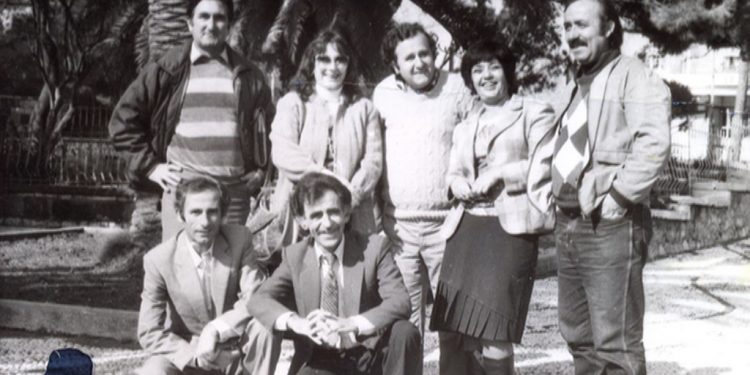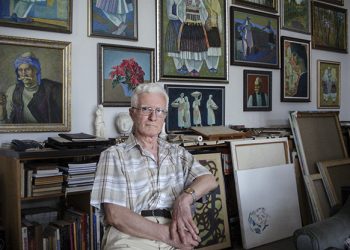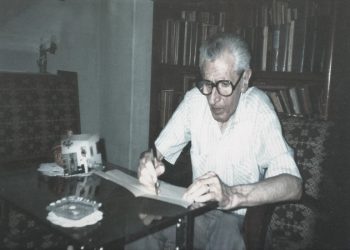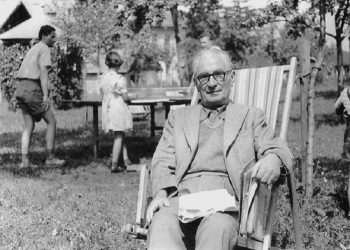Dashnor Kaloçi
The fourth part
Memorie.al publishes the unknown story of the drama “Brown Spots” by playwright Minush Jero, which was first staged by renowned director Mihallaq Luarasi, at the “Andon Zako Çajupi” Theater in Korça where he won the cup of the festival of dramatic theaters and was considered superlative by the then Prime Minister, Mehmet Shehu, but sometime later when she appeared on the stage of the People’s Theater in Tirana, where Enver Hoxha himself was in the lodge, she was criticized and hit by him, as a drama where the working class force did not come out and the micro-bourgeois sentiments dominated ”etc. All the words of Enver Hoxha held at the meeting of the Secretariat of the Central Committee of the ALP, where he ‘crossed’ that part and its authors, calling them ‘stained people’ as well as the discussions of the officials of the Ministry of Education of Culture, such as Miho Gjini, etc., and directors and actors of the Theater “Aleksandër Moisiu” of the city of Durrës, such as: Spiro Urumi, Gjergj Vlashi, Nikolin Xhoja, Llazar Ziu, etc., who issued harsh accusations against their colleagues who had interpreted in that part, as well as the self-criticism of the playwright Minush Jero and the director, Luarasi, after the ‘lightning’ issued by the main leader of the Party towards their work!
The play “Brown Spots”, by Minush Jero (which was performed on the stage of the Metropolitan Theater in 2016 in Tirana), is one of the most talked about and discussed theatrical plays before the ’90s and almost throughout the period of the communist regime of Enver Hoxha.
“Brown spots”, staged by the well-known director, Mihallaq Luarasi, who appeared as a premiere at the national meeting of professional theaters in the city of Korça in October 1969, was considered extraordinary by the then Prime Minister , Mehmet Shehu and she were awarded the first prize, but when it was given in Tirana some time later, where in the loggia was the main leader of the Party, Enver Hoxha, she was anathema by him.
In one of the meetings of the Secretariat of the Central Committee of the ALP, Enver Hoxha himself dedicated one of the items to the agenda, even analyzing it in detail as if he were a literary critic. This would be just the prologue of a ‘storm’ that Enver Hoxha was undertaking against the people of literature, art and culture, which would culminate with the 11th Song Festival on Radio-Television, where again Enver himself would anathema and would be thrown into an unprecedented attack on its perpetrators.
While these events are already known, Memorie.al is publishing a series of documents that begin with the speech of Enver Hoxha at the meeting of the Secretariat of the Central Committee of the ALP, in 1969, where he hit for the first time “Brown spots ”And in the following issues, we are publishing the“ crossroads ”that was made to this drama by senior officials of the Arts and Culture in the Central Committee of the ALP, officials of the Ministry and Culture, as well as colleagues of Minush Jeros and Mihal Luarasi, in the theater “Aleksandër Moisiu” of the city of Durrës, which we have extracted from secret documents (already declassified for years), located in the Central State Archive, the fund of the former Central Committee of the ALP, where so like most of the documents in this book, they are published in full and without any abbreviations.
When only a few days had passed since the meeting of the Secretariat of the Central Committee of the ALP, where Enver Hoxha took into analysis, he harshly criticized and rejected the drama “Brown Stains”, by Minush Jero and Mihallaq Luarasi, which he attended himself from the lodge at the People’s Theater in Tirana, by order of the Culture Sector in the Central Committee that was personally covered by Ramiz Alia, the branch of the League of Writers and Artists of the district of Durres, in early January 1970, organized a “discussion creative “to analyze” the real causes that led the authors of ‘Stains… to that wrongdoing “. And that thing was done, because the playwright Minush Jero was working and living in the city of Durrës, and at the same time a member of the branch of the League of Writers and Artists of that district.
In the archival documents published for the first time in this book, in that meeting, in addition to most of the writers, artists, writers, actors and directors of the Theater “Aleksandër Moisiu” of Durrës, also participated the First Secretary of the Committee of The party of the district, and at the same time a member of the Politburo of the Central Committee of the ALP, Rita Marko, as well as the Chairman of the Executive Committee of the district of Durrës, Iljaz Reka.
Continued from the previous issue
“An act, ideologically wrong, we are not forgiven for not understanding it from the beginning.” “Drama entirely with reactionary tendencies, non-Albanian, has micro-bourgeois heroes.” “Partisanship and socialist realism are completely absent in the work, as there are no positive heroes to carry it.”
These were some of the accusations that were most often articulated that distant January evening of 1970, in the cold hall of the “Aleksandër Moisiu” theater in the coastal city of Durrës, where writers, artists, writers, actors and art lovers had gathered for discussed about the drama “Brown Spots”, which, after receiving the Festival Flag at the national meeting of professional theaters held in the city of Korca in October 1969, a few days later at one of the meetings of the Politburo of the Committee Central to the ALP, she was criticized, accused and rejected by Enver Hoxha himself, who invited all people of art and culture to reflect on that wrong and “stained” work.
In this context, the “creative discussion” was held in the city of Durrës, where the actors and directors of the theater “Aleksandër Moisiu”, who were forced and who with zeal and conviction, stood up to their two colleagues, Jero and Luarasi, who the party had put them in the “dock”.
In the third part of this article in yesterday’s issue, we published the report-information of the branch of the League of Writers and Artists of Durrës district addressed to the Education sector in the apparatus of the Central Committee of the ALP, as well as the discussion of actor Nikolin Xhoja ( ‘Merited Artist’) and that of Gjergj Vlash, (with a few abbreviations) the director of the Durrës Variety, and in today’s article we are continuing with the discussions of the well-known actor Spiro Urumi and Llazar Ziu, Chief Inspector of Culture at the Executive Committee of that district.
Discussion of the Durrës theater actor, with harsh criticism and accusations against the playwright Minush Jero and the director, Luarasi
(Discussion of the actor, Spiro Urumi)
TO DEEPEN IN THE PARTY DOCUMENTS AND IN THE WORKS OF COMRADE ENVER
Insufficient study of the documents of the Party and the works of Comrade Enver, more than for anyone is necessary for us workers of literature and arts. We are fighters of the ideological front, we are in the front line of this front, but do we own this ideology? So today, and now we are dealing with ideological problems. But are we at the required level of mastery of this ideology?
I think not. I am not saying that we do not read and do not study, but our efforts should be multiplied. If we had the right ideological preparation, such mistakes would not have escaped us. I personally feel the need for this ideological rise. I see in myself and my colleagues that there is effort, but not systematic, there is study, but not deep and comprehensive of the works of Comrade Enver.
We have had cases which prove that the ideological level is insufficient. Such were the parts “Such love”, where the socialist society was accused, which was put in the dock as a murderer of love, or “Feast of lanterns”, which had the peaceful coexistence of ideas, where the daughter of the militaristic major and the son of the major the Americans who dropped the atomic bomb on Hiroshima and Nagasaki, fall in love, rise up against their fathers, which is completely abstract and stripped of reality.
For the sake of “Peace”, the Japanese major, Fanomando, his wife was killed and his two sons were paralyzed, blinded by the American Kennedy, while his daughter falls in love, rises up against blood, race.
A FEW WORDS ABOUT DRAMA, WHAT IS “MURRME SPOTS”?
The work “Brown Stains” is a wrong, anti-socialist work. Partisanship, this necessity of socialist realism, is lacking in drama, in two directions. The first is that there are no positive characters to carry this ideology and the second is the ideo-emotional and wrong attitude of the author. Therefore, he neither poses nor solves problems correctly. “Brown spots” does not have the heroism of our days. Here is another indispensable feature of socialist realism.
So, the fundamental mistake is not only that there are micro-bourgeois heroes in the center, but that the heroic one was not opposed to them, as a typical circumstance of our days. As for the popular character of this feature, socialist realism is out of the question. There the language, the phraseology is so complicated, that in the collective once, when they read it, there was a friend who stopped reading and said:
“Read and once again please I did not understand anything at all.” This is because unrighteous thinking is intertwined in such a way that it is not easily understood. Ordinary employees will call that work non-Albanian in terms of content and form. This sound is reinforced by the staging and interpretation of the actors enough to give an idea. The curtain is open.
The decor features a large brown circle. The surface of the circle is visible from the hall, as it is above the metal pipes. The circle horn climbs tangent to a road, even the brown one.
In this circle revolve three micro-bourgeois characters, sing three foreign songs, and our society does not come in to enlighten these people. In an aquarium are three illuminated fish. There are so many reactionary tendencies in the drama that, analyzing them later, it seems strange that you did not understand them in time, you even get angry and feel submissive. The paraphrases and intricacies are strange.
In the Pedagogical Council it is about how a teacher once said to a student:
“You have eyes like being.” So, the teacher insults the student and two meetings are held about it. Suddenly, Lea insulted her colleague three times in a row, calling him a “bourgeois.” See how many knits. For an insult to the student I held a meeting, and for the colleague no?! Let’s look at some moments and judge what the characters say.
Here is what Lea says to the choir that represents our society: “Like me, you seek great happiness, which comes from small love.”
So, Lea blames the choir, blames society. “Ideals are big words, they do not saturate you. “Small loves bring great happiness.” This is the micro-bourgeois flaw, instead of being nailed, it accuses us.
Lea, when talking about her friends who went to the high and distant mountains, as a torch to turn on the Party lights, says:
“For all that was going on, I felt sorry for them, I cried, I called them pleasant adventures.” The doctor shows an equally disgusting attitude: “I wandered after the lek, like a raven after carrion, and carcasses always smell bad.”
See what concept? Can our new doctor run after the lek, like after carcasses?! What are carcasses?! The sick. So, who are these people who get sick in “mining humidity, furnace temperatures, roof tops, masts, cold plants? Aren’t these our people?
This man of noble profession goes so far as to call people corpses, not to go at night to the neighbor’s child, who, as he did not have medical help, died the next day. Do not know who is the wounded man who was thrown into the fire to protect the factory?!
This man seems to feel the voice of the villagers on the chapped lips, cracked and cracked hands that say to him: “Go, go, study, do something and never come back here.” See what microbourgeois doctors own our scene.
While his wife manages to wash the house alone, because some villagers sat there. With disgust and contempt, she literally says: “It has been 17 years since Albania was liberated, and they are still lice”. This is one of the most shameful slanders. We slept for weeks in the countryside, in many houses, but that never happened to us. When I read it now it makes me wonder, how we swallow this thing, these slanders, instead of whistling, so I feel ashamed that I liked it at first.
This is why I feel the need to do self-criticism, taking moral responsibility as well as other friends. I express the conviction that with the help of the Party, we writers and artists will sharpen our vigilance more, and we will never allow such murky works, which darken our reality, to slip through our noses.
SPIRO URUMI
ACTOR OF THEATER “ALEXANDER MOISIU”
Strong criticism and accusations of the Chief Inspector of Culture of Durrës district, towards the drama “Brown spots” and its authors
(Discussion by Lazar Ziut)
SOME THOUGHTS ABOUT THE LESSONS TO LEARN FROM THE ERRORS OF THE DARK STAIN DRAMA
It is important to discuss the lessons to be learned from the ideological errors of the “Brown Spots” drama. The party teaches us to draw lessons from our successes, as well as to analyze our mistakes in a partisan spirit. I agree, in general, with the criticism and condemnation of “Brown Stains” by Minush Jeros. Also, for the staging of the drama by the theater “Andon Zako Çajupi” of Korça, directed by Mihallaq Luarasi.
How can it be explained that Minush Jero, after so many years after the failed drama, “It’s raining outside”, brings out another of the same category? This speaks, of course, of his anti-principle objectivist-bourgeois position, of the insufficient work deepened in the teachings of the Party, to see our socialist reality from the positions of the working class.
I would also tell him that in recent years, when the revolutionization of the whole life of the country, as well as of art and culture in particular is taking great strides, the writing of such a drama, and even worse, the approval staging it, is an event that should really shake us from every nap, no matter how small it would make us lose vigilance.
I do not want to dwell on the analysis of the drama itself. In the first discussion we had, we gave thoughts about it. In the press, as here today, it was rightly talked about its serious ideological mistakes. I also do not want to talk about the shortcomings or the mistakes of the “Çajupi” theater that put it. Take the issue of our theater and variety troupe. Undoubtedly their work is very positive and as such is appreciated.
This year ‘s national festival justified, as it were, the positive work of our bodies. But when we analyze, even our best shows, like “People on the Rock” or “Two with Zero” or “Kosta Bardhi Mill”, we again come up with a series of flaws, especially in terms of strengthening the idea of control of the working class (in the first), for strengthening the positive roles in comedy, or of the role of the Party and typically in the liberation war, in the third drama.
These weaknesses ascertained, among others, have their source in our work, in our formation, in the clear and deep ideological position of ours (directors-actors) because for the very nature of stage art, the directorial concept or the acting embodiment of the role constitutes at the same time, (with the data of the author of the drama) the feelings, concepts, worldviews of the performer (director-actor).
Therefore, in addition to condemning the drama “Brown Spots”, we cannot but condemn with the same force the performance of the theater “Çajupi”, as well as behind the weaknesses of the parts staged by our theater “A. Moses “we cannot fail to see the weaknesses of our direction and our body. Comrade Enver teaches us: “The principled critical attitude towards all literary-artistic creativity should characterize the governing bodies of all our artists and writers.”
For all the valuable lessons of the Party, we are today examining precisely the mistakes that have to do with slipping from the path of “principled critical attitude”: We are in front of the principled mistakes of the author who wrote the work, starting from foreign positions for our class concepts : before the principled mistakes of the “Çajupi” theater and its troupe, who embraced and gave stage life to this ideologically wrong work, before the principled mistakes of the Ministry bodies, which approved and allowed the coming of this play to the festival.
Before the principled errors of the jury, which judged her by the straw, closing, as it were, her eyes to her black ideological stains:
In the face of our mistakes that we did not point out in time as soon as we saw and strongly saw its principled wrong sides, even when we were signaled by the Party in the circle: All these mistakes illustrate the fact that we need a further deepening, for a class-revolutionary strengthening of our position as artists, as actors, as bodies. Second remark:
During the discussions in Tirana, regarding the drama “Brown Spots”, opinions were expressed that “one of” its rare qualities “is that” to be understood in the end it had to be seen two or three times, this opinion of course does not stand at all, he is upside down. The first requirement for a work of art is precisely its ideological clarity, its simplicity, to be understood quickly by everyone and by the simplest spectator.
How, then, can the drama “The Brown Spots” be called full of intellectualist phraseology, full of views as “brown” full of phraseology as vague, expressed in a whole tautology of words, as a work “with special artistic merit”? Do we not try to enter through the window those that come out of the door? /Memorie.al
LLAZAR ZIU
CHIEF INSPECTOR FOR CULTURE, AT EXECUTIVE COMM.
K.P. OF DURRË DISTRICT.
Continues in the next issue




